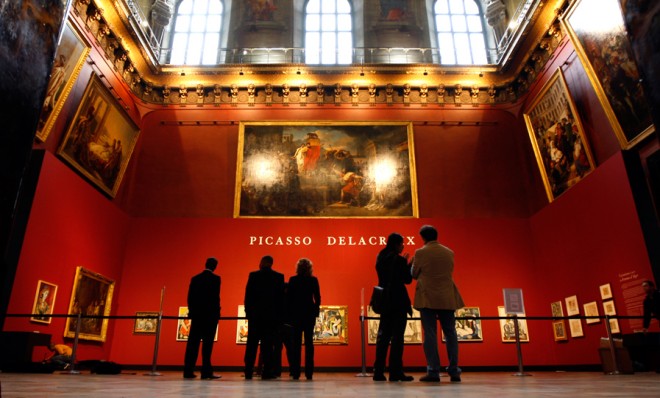How a gang of pickpockets shut down the Louvre
French museum workers walk out as the home to the Mona Lisa is plagued by increasingly aggressive thieves


A free daily email with the biggest news stories of the day – and the best features from TheWeek.com
You are now subscribed
Your newsletter sign-up was successful
Employees at the Louvre agreed to return to work on Thursday after a one-day walkout, but only when their bosses said they'd tighten security to crack down on increasingly aggressive gangs of pickpockets at the famous Paris art museum. The strike left crowds of disappointed tourists waiting for hours outside the Louvre, home to such masterpieces as the Mona Lisa and the Venus de Milo. About 200 of the 450 staff members it takes to run the museum participated in the walkout, and 100 of them picketed in front of the Ministry of Culture demanding that the government tackle the problem. So what's all the ruckus about?
Why are the gangs so threatening? Museum workers say the pickpockets cruise the Louvre in groups of up to 30. They're usually minors, so they can get into the Louvre any time, as admission is free for visitors under 18. English-speaking tourists complain that the thieves, many of whom are immigrants from Eastern Europe, target them, asking, "Do you speak English?" or giving them an English postcard to sign or read. While the person is distracted, more of the thieves show up, grabbing the victim's wallet or other valuables and then quickly walking away.
And the danger is increasing: Museum employees have increased their pleas for help as the pickpockets grow more aggressive. Workers say the kids spit at them, insult them, threaten them, and even attack them when spotted. "The children are tough and very well organized," one member of the staff tells Britain's Telegraph. "We can only do so much, but arrests are usually impossible because of their young age. If they are kicked out, they return the next day. They are very aggressive towards staff, putting people in danger of attack."
The Week
Escape your echo chamber. Get the facts behind the news, plus analysis from multiple perspectives.

Sign up for The Week's Free Newsletters
From our morning news briefing to a weekly Good News Newsletter, get the best of The Week delivered directly to your inbox.
From our morning news briefing to a weekly Good News Newsletter, get the best of The Week delivered directly to your inbox.
This isn't exactly a new problem, though: "There are always pickpockets at the Louvre and other tourist hot spots in central Paris, but for a year and a half they have been more and more violent... and their way of working is well organized," Sophie Aguirre, a member of the museum workers' union, tells Britain's Guardian. The union last year lodged a formal complaint with the state prosecutor saying that the thieves are targeting both visitors and staff members in the vast galleries.
How are authorities addressing the problem? After the employees filed their complaint to prosecutors last year, the museum stepped up cooperation with police and began barring anyone already identified as a pickpocket from entering the museum. Now authorities have agreed to increase police presence at and around the Louvre. The stakes are high for the city. The Louvre is the world's most heavily visited museum, with nearly 10 million visitors each year. At this time of year, 30,000 people arrive each day, and their impressions can have a direct impact on the city's image among tourists, an important source of income for the French capital. And the widely publicized Louvre walkout comes as the city is still recovering from another recent blow to its reputation, when thieves attacked a tour guide and stole passports and a large amount of cash from a group of 23 Chinese tourists who had just arrived in the country.
A free daily email with the biggest news stories of the day – and the best features from TheWeek.com
Harold Maass is a contributing editor at The Week. He has been writing for The Week since the 2001 debut of the U.S. print edition and served as editor of TheWeek.com when it launched in 2008. Harold started his career as a newspaper reporter in South Florida and Haiti. He has previously worked for a variety of news outlets, including The Miami Herald, ABC News and Fox News, and for several years wrote a daily roundup of financial news for The Week and Yahoo Finance.
-
 Local elections 2026: where are they and who is expected to win?
Local elections 2026: where are they and who is expected to win?The Explainer Labour is braced for heavy losses and U-turn on postponing some council elections hasn’t helped the party’s prospects
-
 6 of the world’s most accessible destinations
6 of the world’s most accessible destinationsThe Week Recommends Experience all of Berlin, Singapore and Sydney
-
 How the FCC’s ‘equal time’ rule works
How the FCC’s ‘equal time’ rule worksIn the Spotlight The law is at the heart of the Colbert-CBS conflict
